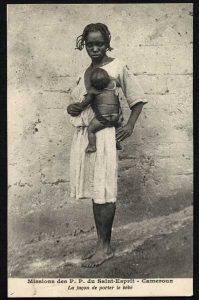This post brought to you from the confines of my humanistic little heart.
I am in the midst of an interesting internal debate with external consequences. I think I don’t like History. I am also so/so on history. Actually, I am probably currently rejecting any kind of historical derivative as well. Despite this, I am in love with the idea of looking at the past.
This line of thought started a while ago, but came to a head with the following image.
 (I created a mini-project around the recent conversation/thoughts I’ve had and am having about this photo: http://jadedid.com/cameroon/)
(I created a mini-project around the recent conversation/thoughts I’ve had and am having about this photo: http://jadedid.com/cameroon/)
Here is what is happening. History feels like myth to me. There are too many (w)holes and the narratives are to totalizing for my comfort level. I was speaking to someone about my project, and they said that they can never see the image in a photograph as separate from the history the photograph was created in. This meant that any photograph of black people they see are read as part of a horrible historical narrative regardless to the image in the photograph. [I am thinking of photograph as the thing and image as the read because it is easier than explaining Barthes]. This meant that, for said person, black people in the United States had no existence outside of the confines of a History of (violent) slavery. And, as this person was a black American, their existence was also articulated by slavery. I acknowledge that the legacy of slavery still exists in our social structures. However, that is not all black people are, nor has it ever been. If this is what history is doing to people, I don’t want it. But I knew this. I have major issues with the type/time (I wrote time initially when I meant to write type, but I think it works too. Yay Freudian slip) of empathy historical narratives of trauma create. I have a whole map of this system that I was not going to include in my dissertation (I was using it as a way to keep the work I am doing on track), but now I think I have to because I do not want this reaction. Nor do I want to be pulled back into the space of everyone always only being an agent of history.
There is quote that I commonly see attributed to Harriet Tubman that I thought of as I was going through all of this. I have no idea if it was really said by her or not, but I get the sentiment of both the speaker and the”not knowing” subjects being conjured.
I freed a thousand slaves I could have freed a thousand more if only they knew they were slaves.
So, I move to the past. The hinge of how I think of the historical past is not History, but a temporal separation. I am playing with coevalness and presence, and the freedom that the speed of digital contact gives us. I am not saying we need to end History. I think we need it and it is necessary. I applaud anyone who can spend their life’s work looking at traumatic imagery and narratives. I am thankful they are able to write about it, theorize it, analyze it etc.. I am thankful for those who are out there writing counter narratives and working on understudied H/histories. I am thankful that those people exist, because I can’t do it. And if those people weren’t doing it, I couldn’t do the project I am doing. Histories need to be known. But we also have to accept that the past for many people was just that. Many people just lived their lives, just like we are. That is where I find beauty, at times tinged with sadness. It is beautiful none the less.